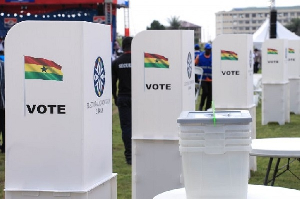The people of Afram Plains, an agriculturally rich yet infrastructurally neglected region in Ghana, have long suffered the consequences of unfulfilled promises from successive governments. This article explores why a boycott of current and future elections may be a necessary course of action for the residents, particularly concerning the long-awaited construction of a bridge over the River Afram and the road from Ekye-Amanfrom to Agordeke.
For decades, the communities in Afram Plains have been assured that the construction of a bridge over the River Afram would enhance transportation, foster economic growth, and improve access to essential services. Each electoral cycle brings renewed promises from candidates who recognize the urgent need for infrastructure development. Parliament in 2022 approved an amount of Three Hundred and Fifty Million Euros (€350,000,000.00) for the construction of approximately 3.6km of a 2-lane bridge, including service lanes and a walkway to connect Adawso and Ekyi Amanfrom and 124Km Adawso-Ekyi-Amanfrom-Donkorkrom Roads within the Afram Plains enclave. However, as these cycles of failed promises repeat, the bridge remains a distant dream, and the people are left to grapple with deteriorating roads and inadequate access to markets and social amenities.
The lack of a reliable bridge significantly impedes trade and movement. Farmers are unable to transport their goods efficiently, leading to increased post-harvest losses and diminished income. Moreover, students face challenges in accessing educational institutions, while healthcare services remain out of reach for many due to transportation barriers. The consequent stagnation of economic development has resulted in widespread disenchantment among the populace, eroding trust in political leadership.
In light of these ongoing issues, the argument for a boycott of elections becomes compelling. A unified refusal to partake in the electoral process could serve as a powerful message to both current and prospective leaders, compelling them to take the concerns of Afram Plains seriously. Here are several reasons why a boycott could be effective: 1. **Demand for Accountability**: By not participating in elections, the citizens can convey their frustration over the lack of accountability among their leaders. An electoral boycott signifies that the electorate will no longer support candidates who fail to deliver on their commitments.
2. **Strengthening Community Solidarity**: A collective decision to abstain from voting can foster unity within the community. It encourages dialogue among residents about shared grievances, galvanizing efforts toward meaningful advocacy.
3. **Pressure on Political Parties**: Political parties depend on votes to remain relevant. A boycott highlights the potential loss of support in regions that feel marginalized. Such pressure may compel parties to address the infrastructural deficits that persist in Afram Plains.
4. **Rethinking Strategies for Change**: Rather than perpetuating a cycle of disappointment, a boycott could encourage citizens to explore alternative means of engagement with the political system. This might include peaceful protests, petitions, or community organizing to advocate for immediate infrastructural improvements.
The residents of Afram Plains find themselves at a crossroads. Continuous neglect and unfulfilled promises regarding critical infrastructure developments, specifically the construction of a bridge over River Afram and the road from Ekye Amanfrom to Agordeke, warrant a reevaluation of their engagement in the electoral process. A strategic boycott of current and future elections could serve as a powerful tool for demanding accountability and fostering sustainable change. In doing so, the people of Afram Plains can reclaim their voice and ensure that their needs do not continue to be overlooked by those in power.
Jones Ofori-Attah is the External Affairs Coordinator, Elijeko Foundation oforiatta.jones@yahoo.com
Opinions of Friday, 4 October 2024
Columnist: Jones Ofori-Attah



















